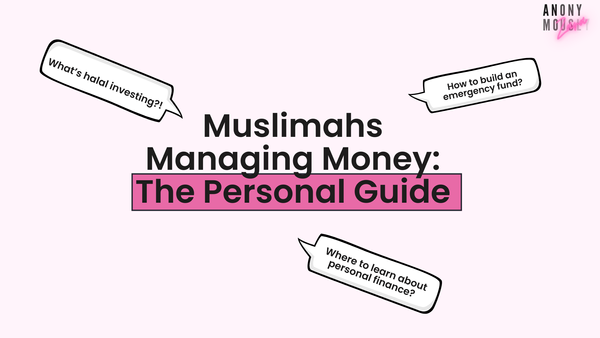Time to get my financial life together.
Just to give some context – I hate opening my bank app. (I mean, who doesn't hate it? Jeff Bezos, maybe?). I put it off all the time and then rely on my not-so-practical motto of "what you don't know can't hurt you!" 🤷🏽♀️
Anyways, the other day I was waiting for my sister in the car whilst she attended a doctors appointment.
I had about an hour to kill so I started reading 'Broke Millennial' by Erin Lowry. And not only did this book make me less afraid of money, it also boosted my confidence when it came to managing it successfully.
I love to spend my money – I can honestly admit that.
I have the urge to treat myself to a shopping spree whenever the next pay check flies into my account. So I needed to know how I could improve my financial situation without becoming a 'savings freak' or declining every social event I'm invited to (not that there's many – awks.)
Here's the 5 things I learnt that revolutionised my financial roadmap 👇
Okay let's break down each of these tips to reach the essence of what they really mean:
Wait, What's a Financial Roadmap?
A financial roadmap is basically a visual or mental guide that helps you remember your financial priorities and goals. It's designed to help you maximize your money with longer-term goals in mind.
#1 Unearthing Those Psychological Roadblocks
Money can be frightening. But why are we so afraid of it? What is it about these numbers that make us squirm and hide?
Addressing these 'dollar triggers' is the first step to improving your financial roadmap.
Think of it like a phobia. As a self-confessed cynophobic (someone who is petrified of dogs), I know that this fear stems from somewhere. The root is that all my older siblings are uncomfortable around animals so, inevitably, this spread to me. I would witness their behaviour around (mostly) dogs and started to associate 'danger' with animals as a result.
The same concept applies to money. We are afraid of money but there's always a deeper root to it all.
It's important to remember that not everything is as it seems. Even your friend who may seem super financially-stable may be dealing with struggles you don't know about.
We all have psychological roadblocks when it comes to parenting, money, marriage, career choices – whatever it may be. So being able to accept these deeply-rooted tensions is the first step to overcoming them.
These answers will help you figure out if your current relationship with money is a consequence of your past experiences.
#2 My Parent's Relationship with Money isn't the Only Way
What were your parents like with money?
As creatures of habit, we often emulate the behaviours of those who around us – our parents, guardians, older siblings etc. are what we call our first insights into all worldly matters.
As the saying goes, "the majority of our education stems from the home".
But, just because our parents or guardians acted a certain way towards money, it doesn't mean that will automatically be the same for us.
Either:
- You grew up with parents who were in an ongoing, unfortunate battle with their finances which led to many difficulties within the home.
- Your parents could have been lavish spenders who weren't worried about staying on a tight budget.
- Or money was just never really talked about
If your parents lived with financial stresses looming over them, chances are you may now have some frugal habits with the phrase "money doesn't grow on trees" echoing in the back of your mind at all times.
Whatever your parent's relationship with money was / still is, you have the power to dictate your own. It's a new era and things are lot different to 15-odd years ago. Technology has certainly made it easier to manage money with banking apps that keep track your spending for you.
Don't let your parent's connection with the coins make you feel shame or vulnerability. It's important to embrace their journey with it, and decide what we want ours to look like.
"When we deny the story it defines us. When we own the story, we can write a brave new ending" – Brene Brown
#3 Creating and Maintaining a Fun Fund!
Budgeting doesn't need to be a drag.
A fun fund is money you set aside that is solely spent on the things you enjoy, like:
- Dinner with your friends 🍜
- Holiday with your family / spouse 🏝
- Overdue shopping spree with your bestie. 🛍
It's essentially the 'guilt-free purse' for all your expensive desires!
I think downtime is important. Giving yourself a moment to unwind amidst the stresses that life brings is what allows us to stay afloat. When I used to think about treating myself to a spa day or a nice treat, my biggest setback was – "I could just spend this money on something else so I'll leave it"...
The truth is – yes, its important to be sensible with our money – but you still deserve to enjoy your life.
If money is the factor stopping you from winding down from time to time, then a fun fund is ideal for you.
Steps to creating a fun fund 🎉
- Set a Goal – What's the activity you're saving for? This is where we build the excitement!
- Write Down the Estimated Cost – What's it all gonna cost then?
- Decide How You Want to Save – You can either open up a separate savings account, or go old-fashioned with it and get that money jar out!
- Any Ways of Getting Extra Money? – If you want to top up your fun fund more often, consider starting up a side hustle or selling a few items to reach your goal quicker.
- Break the Bank! – Literally. When the time has arrived – open up at that savings account and enjoy the fruits of your labour.
#4 Deciding if Your Money is Marriage Material
We all can guess what this one means, right?
When someone is 'marriage material', it means you see a future with them. They fit your idea of a desirable spouse, and we're committed to making a marriage work with them.
Can this concept apply to money?– heck, yeah!
Okay I'll admit, when I first heard that you have to see your money as marriage material, I was like "whaaat are you talking about?" – but hear me out 👇
When money graces your bank account, do you treat it as a 'spend-it-and-don't-care-about-it' kinda thing? Or are you nurturing it?
Are you running it to the ground, or giving it all that it needs to grow and prosper?
Like a loving marriage, money presents opportunities and advantages when you work for it. Although, it's good to not overthink our financial situations and let it dictate our lives, there's nothing wrong with taking a more long-term view and setting out future goals.
#5 Live Like No-One Else
"If you live like no one else now, you can live and give like no-one else later" – Dave Ramsey
But what does this all mean?
Anything in life you want to win at...you have to work at.
Whether you want a better body, strong connection to your faith, a successful marriage – you have to work for it.
Living like no-one else means resisting certain desires, making more rational choices, and putting in the hard graft now and then enjoy the outcome for years ahead.
As a twenty-something year old, I fall into the trends and the latest products. I want the same experiences as those in my age group – but what if I held back slightly?
What if I just limited myself to get ahead of the game and have a better chance of gaining bigger and better opportunities a little later on?
We are frightened of sacrifice, but maybe it's the thing that eventually sets us free.

5 Tips to Managing Your Money Better in your 20's: Summary 📚
Okay so there you have it folks..The fabulous five tips to (hopefully) help you manage your money a little better!
The main point to remember is that we have control over our financial mentality. When we practice gratitude, think about our choices before making them, and give to others – there's no doubt that our relationship with money will become a healthier, more successful one.






Member discussion